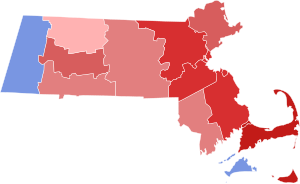This article needs additional citations for verification. (May 2021) |
The 1830 Massachusetts gubernatorial election was held on April 5.
| |||||||||||||||||
| |||||||||||||||||
 County results Lincoln: 40–50% 50–60% 60–70% 70–80% 80–90% Morton: 50–60% | |||||||||||||||||
| |||||||||||||||||
National Republican Governor Levi Lincoln Jr. was re-elected to a sixth term in office over Democrat Marcus Morton.
General election
editCandidates
edit- Levi Lincoln Jr., incumbent Governor since 1825 (National Republican)
- Marcus Morton, Associate Justice of the Supreme Judicial Court, former acting Governor and nominee since 1828 (Democratic)
Campaign
editFor the first time, Justice Morton consented to his nomination. Privately, he expressed little hope of success and said that he did not hope to obtain more than one third of the votes.
David Henshaw's Statesman campaigned vigorously for Morton, upbraiding Lincoln as a renegade Republican who had accepted support of the Essex Junto and lauding Morton's support for the Warren Bridge Company. Theodore Lyman II's rival Democratic Evening Bulletin made no effort on Morton's behalf.[1]
Lincoln took little interest in the election, focusing on new projects for railroads and Massachusetts's claim for war debts against the federal government.[1]
Results
editLincoln was once again victorious, though by a dramatically reduced margin. Morton wrote to John C. Calhoun to express his view that the Jackson administration had cost him several thousand votes by dismissing Henshaw supporters from federal office to placate the aristocratic Lyman wing of the party.[1]
| Party | Candidate | Votes | % | ±% | |
|---|---|---|---|---|---|
| National Republican | Levi Lincoln Jr. (incumbent) | 30,908 | 65.52% | 6.11 | |
| Democratic | Marcus Morton | 14,440 | 30.61% | 11.11 | |
| Write-in | 1,825 | 3.87% | 5.00 | ||
| Total votes | 47,173 | 100.00% | |||
See also
editReferences
edit- ^ a b c Darling, Arthur B. (1925). Political Changes in Massachusetts, 1824–1848. New Haven, Conn.: Yale University Press. pp. 75–76.
- ^ "MA Governor, 1830". OurCampaigns. Retrieved May 17, 2021.

